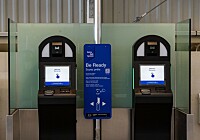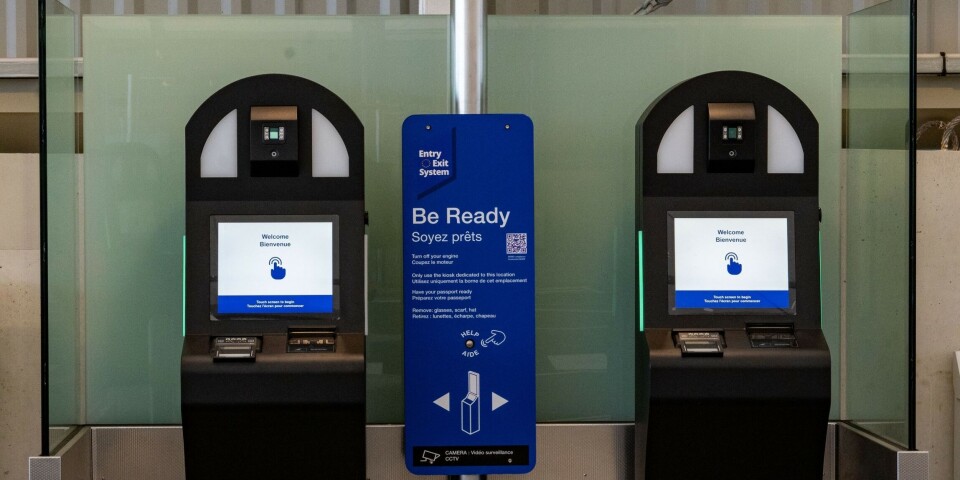Many of those subject to the new Entry/Exit System (EES) when travelling to France from the UK are set to skip the ‘travel questions’ stage on registration during the six-month launch period, amid fears of long delays.
French authorities have agreed that during the six-month phasing-in period, many passengers will not be required to answer questions about ‘sufficient funds’, return tickets, medical insurance and accommodation as part of the new border regulations.
It comes after Eurostar officials asked for a temporary suspension amid fears that the questions would “confuse” travellers.
The Port of Dover has also confirmed it will not ask passengers that need to register for EES such questions during the phasing-in period. Questions are also currently not being asked at the Eurotunnel entrance (for Le Shuttle) in Folkestone.
These are the three EU border points where French border checks are done on UK soil.
However, the questions may be reinstated after the end of the phasing-in period, so by April 2026 at the latest.
For all other passengers, EES procedures can be conducted upon arrival (airport, port, train station, etc) inside the EU. There have been no updates as to the use or otherwise of the questions at French airports so far.
While the questions have been in the media spotlight in the run-up to EES, with uncertainty over the exact format and whether paper ‘proofs’ might also be required, we note that they are not a core part of the EES system and not included in the regulations setting it up.
They are long-standing rules from the Schengen Borders Code (rules for external borders), other than the one stipulating prerequisite medical insurance, which is a French-law rule and also not new.
It has however, long been expected that France would build the questions into the ‘pre-registration devices’ for EES (self-service kiosks, or tablet computers) so they were asked more systematically.
Currently, only a small percentage of passengers using the Eurostar are being asked to comply with the EES process while the phasing-in period is underway, with the number of passengers logged in the system gradually ramping up.
Despite the installation of kiosks, the procedures are currently being carried out manually, although the kiosks will be used in the coming months.
At the ports of Dover and Folkestone, only coach passengers are currently impacted by EES regulations.
Other passengers through Dover are likely to be impacted from November 1, and at Folkestone checks for people in their own vehicles will come in “a few weeks after” the October 12 launch.
You can read more about the EES on our website in our dedicated portal here.
Questions paused
EU border officials have always been able to ask questions to travellers entering the Schengen area but have rarely opted to do so.
Under the EES however, it had been planned they would be built into the pre-registration kiosks and tablets, and a pre-registration app being trialled is also planned to include them.
At the Eurostar terminal, a trial version of the kiosk was shown in early October to ask:
What is your situation? (eg. EU citizen, visa, residency permit, other)
Do you have proof of accommodation? (eg. hotel booking, accommodation certificate) – to which it was possible to answer ‘yes’, ‘no’, or ‘don't know’
Do you have a return ticket?
Do you have sufficient means to cover your stay (credit cards etc)?
Do you have medical insurance?
These are standard ‘borders code’ questions excepting that for medical insurance, which is a French-law requirement. However, France says that for people coming from the UK a Ghic/Ehic health insurance card is the required minimum.
Note that the questions apply to passengers even if taking a service to Brussels or Amsterdam – and not going to France – as French authorities are in control at the border point.
Depending on a passenger’s answers, border guards could ask additional questions or ask for documents.
“We know those questions have caused significant confusion, particularly within the kiosk process,” said Eurostar’s chief stations and safety officer Simon Lejeune to the House of Lords Justice and Home Affairs Committee.
“We’re very pleased that, through discussions with the French ministry and our colleagues, it’s been agreed that those questions can be technically removed from the kiosks during the initial six-month introduction phase of the new system.”
Mr Lejeune added that he believed the French authorities were “quite strict” about their implementation of the new rules.
Ministry confirms questions can be turned off
The Interior Ministry also confirmed to The Connexion that the questions can be ‘turned off’ by the border guards.
Officials told us prior to last Sunday’s launch: “The questionnaire can be activated or deactivated based on the assessments of the border police. It is not obligatory, as the traveller in any case then meets a border guard who can ask questions - as was already the case.
“So, it is probable that travellers won’t find themselves being presented with this questionnaire.”
The officials added: “The questions will be the same on all the kiosks, but the guards can ask questions they want to ask as long as they are linked to these same verifications.
“They can also ask for proofs. EES doesn’t change anything in this regard.
“The questionnaire is only indicative and serves as an aid to decision-making by the guards, who will make an assessment of the situation, like before.”
‘50-second checks’ without questions
With the current decision to turn off the questions, Mr Lejeune said the system was so far working well.
“I was observing transaction times of 50 seconds. That’s for the full biometrics, as well as the passport check and the stamping for EES-eligible passengers.
“That’s without the kiosks that do that pre-registration, which we’ll be introducing over the next few weeks,” Mr Lejeune added.
Only a handful of EU entry points currently require passengers to register for EES when passing through, and by the end of the month 10% of border crossings in each Schengen Zone country must be enforcing the system.
Early teething problems were reported at Prague Airport on the first day of operations, however outside of this there have been few media reports of excess queues.
This may change as the system is enforced at more border crossings.
Passport stamping will be maintained until EES is fully implemented.




























